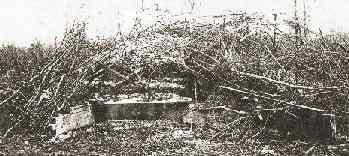 89th Division |
RAIDING PATROLATSEICHEPREY |
A Doughboy Center Mystery
Discovered by Great War Society Member
Capt. Virgil Roberts
|
This story describes a trench raid gone wrong near the village of Seicheprey on the south edge of the St. Mihiel Salient in August 1918. It was submitted by Great War Society member Virgil Roberts. In 1993, Capt. Roberts saw an ad in a military journal placed by Margaret Portaus of Paona, Colorado offering to pass an original historical document from the Great War on to someone who could appreciate it. She found his letter to be the most interesting reply and sent it to him. She later told him she had no recollection of how she got it nor any information on the author, Corporal Arthur R. Walker of Company I, 355th Infantry of the 89th Division. The story seems to be an authentic, apparently unprofessional, but factual rendition of an exciting event during Corporal Walker's service. The 89th Division was in this area at this time but there is some question as to whether the village of Seicheprey was in no-man's-land on the date reported or inside American lines. The editors are seeking any confirmation of the facts of this story and information about Corporal Walker. Another mysterious thing about the original manuscript is that the name "Daisy" appears twice at the top of the original manuscript, both typed and handwritten. Here's the original story with some spelling corrections and the author's very long sentences broken up: Daisy[?] RAIDING PATROL AT SEICHPREY The Vicinity of SeichepreyWhen I entered the dark, foul smelling dugout, which was full of telephones and wireless apparatus, the officer was setting at a table studying a map and reading some correspondence written in cypher. He looked up and said, "Corporal Walker, pick a man from your squad who is coolheaded and can be depended upon and report to me at two o'clock at the end of trench No. 5 in the front line." "Yes sir," I answered and hunted up the man I wanted and we put ourselves in patrol regalia for we knew well what was in store for us. Going to the supply Sergeant we drew a quantity of cotton to stuff between the clips of ammunition in our cartridge belts, around our revolvers and trench knives and belt buckles so nothing could rattle. Then discarding the old tin hat and putting on the overseas cap, we reported. Lieutenant Broyles and 5 men were waiting for us and while we smoked a few cigarettes he explained the nature of the night's work ahead of us. We were to raid a section of the German front line directly in front of Seicheprey, a town in "no-man's-land". I had been through that country a few nights before and knew what we were up against for that section was a labyrinth of torn up trenches which had been fought over, back and forth for 4 years and afforded excellent cover for German snipers and patrols. About 4 P.M. we started slowly down an old communicating trench toward the town, taking our time as the sun was still high and we didn't want to make the deserted village before nightfall. We figured our time well getting into the streets at dark and carefully crawling in the shadows along the walls. We found a building where we [manuscript apparently damaged slightly or folded here...knew the "Seicheprey Boyeux" ?] entered the back room through a trap door in the floor. The officer and I had been through it before.  Seicheprey: Scene of the ActionSo we sat down on the firing step and watched the beautiful display of star-shells, flares and rockets in both our own and the enemy line. [We] listened to the heavy boom of the artillery, the spattering of machine guns and all the other noises which started every night at the front. The moon came out flooding the whole country with a weird, ghostly light and we started quietly down the trench which was in good repair except in a few places where a shell had filled it full. At these places it was necessary to use every precaution in crossing over as the shell craters were as white as snow from the chalky formation underlying the thin layer of soil. Arriving at a point where the trench was completely destroyed by shell fire the patrol closed up and we held a council of war. The Lieutenant gave us orders to deploy as skirmishers, keep in touch with each other by clicking the safety of our automatics and proceed toward the enemy lines which were now less than a hundred and fifty yards away. Upon reaching the lines we were to wait for a rocket from Broyles, then go over the parapets, have it out with whoever was there and get back home with a prisoner. We had heard no sound which would warn us we were running into a trap until a great white flare went up about 40 or 50 yards ahead of us making the whole scene as bright as day...At the same instant a line of machine guns and rifles opened a rapid fire on us. Taking cover in the shell craters we hugged the ground as bullets were throwing the mud up all around us. I turned my head toward the officer to see what he was going to do and as I did so I saw his right arm go up and fire a rocket. It was a three-star shell which meant "Every man for himself". So not waiting for anything further I fell back over the shell hole and ducked into the wire and headed for a friendly country. The going was hard as the entanglements were in a good state of repair except along the trench through which we had come. And to follow that line now would be to court disaster for the enemy had no doubt been tipped off and had a patrol back of us watching for a retreat that way. The night was getting pretty well along and I was anxious to make as good time as possible in order to get to our lines before daylight. I was getting near the town again and the wire being so thick I knew it would be impossible to go around and avoid the town and still make it back to our lines by morning. So I crawled as straight toward the ruined village as possible getting into the first street without any trouble.  Typical German Machine Gun NestIt started to rain and wet me through, but the rain was in my favor - making it easier to move with less noise. So, I crept along a wall getting into the main street in front of the church. The rain stopped and the moon came out brighter than ever. I had to cross that street, regardless of what happened, in order to get into the trench leading home. [The] trench was less than a hundred yards away, so I crossed the street and crawled past the steps of the church, hoping to go around it. But the way was blocked with hurdles of wire making it impossible to go that way. Returning past the church, I attempted to go around to the left, but the ground was covered with wire and sheets of iron and tin cans which made too much noise. There seemed but one way out and that was to go through the church. I am not superstitious nor am I afraid of anything that I can see when I have a rifle, 2 six-shooters and a knife, but I hesitated quite a while before tackling that job. Slinging my rifle on my back ... pulling one revolver and loosening the other in the holster, I went quietly up the steps and crawled into the church. The roof was full of holes where shells had smashed through covering the floor with broken tile and piling seats and debris all around. When it became necessary to cross a patch of light where the moon was shining through the holes in the roof my heart would stop beating and I could feel the whole German Army watching me...I finally got up in front where the Virgin May was still standing before the altar, but I knew if it came to a show-down she would not be of any great help to me...Now that I was inside the church, I was afraid to stick my head out of the back door for fear some Dutchman would take it off. In the court was a graveyard and along the right side was the remains of a row of grape vines, the lattice work throwing sufficient shadow for protection...Getting along side of it, I made a sneak for the trench. I thought I knew it well, but I failed to see any familiar signs...[However,] I was in a trench, it headed my way and it was getting late in the morning, so I made good time for a couple of hundred yards...Here the trench was destroyed forcing me to get down on my belly and crawl again. I had gone maybe a hundred yards and was just creeping out of a big shell crater and was having trouble [-] the rain had made the chalk as slick as grease [-] when I heard a sound close to me and to my right. I could not stay there, so pushing my rifle ahead of me, I pulled myself up until my head was above the edge of the bank of clay thrown up by the shell...[Then] I did hear a sound, the three sweetest words every spoken in any man's language, for a Yankee doughboy said: "Halt, who's there?" I was home. "A friend," I answered. "Give the countersign," he said. "I can't," I replied. "I was a member of a patrol last night, we got into trouble and separated." After telling him my name, rank and all I could, he told me to advance with my hands up and to leave my ordinance equipment behind me. When I stood up I saw him standing in a small trench alone, but he had the sights of his rifle on a line between my eyes. After giving him information enough, he went back with me after my rifle and belt, then told me I was on Company M's sector and directed me how to reach my outfit. He gave me the password and I arrived at the dugout where Lieutenant Broyles was waiting. All the rest of the patrol had shown up unhurt...[A]fter feasting on a plum pudding from the officer's kitchen, I went in and dropped like dead on my bunk until morning. Corporal Arthur R. Walker Co. I, 355th Infantry, 89th Division |
To find other features on the DOUGHBOY CENTER visit our
General Headquarters
For further information on the events of 1914-1918
visit the homepage of
The Great War Society
Michael E. Hanlon (medwardh@hotmail.com) regarding content,
or to Mike Iavarone (mikei@mcs.com) regarding form and function.
Original artwork & copy; © 1998, The Great War Society